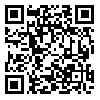Volume 10, Issue 3 (12-2018)
2018, 10(3): 7-12 |
Back to browse issues page
Download citation:
BibTeX | RIS | EndNote | Medlars | ProCite | Reference Manager | RefWorks
Send citation to:



BibTeX | RIS | EndNote | Medlars | ProCite | Reference Manager | RefWorks
Send citation to:
Boskabadi H, Ashrafzadeh F, Nematnezhad M, Faraji E, Tohidi H. Clinical Round Effects on Parents of Children who are Admitted in Pediatric and Neonatal Departments. North Khorasan University of Medical Sciences 2018; 10 (3) :7-12
URL: http://journal.nkums.ac.ir/article-1-1581-en.html
URL: http://journal.nkums.ac.ir/article-1-1581-en.html
Clinical Round Effects on Parents of Children who are Admitted in Pediatric and Neonatal Departments
1- Professor, Neonatologist, Mashhad University of Medical Sciences, Mashhad, Iran
2- Professor, Pediatric Neurologist, Mashhad University of Medical Sciences, Mashhad, Iran ,ashrafzadehf@mums.ac.ir
3- Medical Student, Mashhad University of Medical Sciences, Mashhad, Iran
4- Cardiologist, Mashhad University of Medical Sciences, Mashhad, Iran
2- Professor, Pediatric Neurologist, Mashhad University of Medical Sciences, Mashhad, Iran ,
3- Medical Student, Mashhad University of Medical Sciences, Mashhad, Iran
4- Cardiologist, Mashhad University of Medical Sciences, Mashhad, Iran
Abstract: (4740 Views)
Introduction: Previous studies investigating the role of emotion in working memory suggest that emotion plays an important role in working memory. The present research aimed at investigating the effectiveness of process emotion regulation training in visual-spatial and verbal working memory.
Methods: Therefore, 26 students of Kharazmi University (16 females and 10 males) were selected through volunteer sampling and underwent the of Process Emotion regulation strategies training. All individuals were evaluated during three stages of training (prior, meanwhile and subsequent to the training) using the Working Memory Index. Variance analysis with repeated measurement and Bonferroni post-hoc test were used in for analyzing the results.
Results: The results indicated that Process Emotion regulation training increases the visual-spatial and verbal working memory capacities. Conclusions: With regards to the results of the present research, it could be concluded that emotion regulation might lead to information preservation and boost the verbal and visual-spatial capacity of working memory by the means of decreasing the impact of emotions influencing the deficit in working memory function.
Methods: Therefore, 26 students of Kharazmi University (16 females and 10 males) were selected through volunteer sampling and underwent the of Process Emotion regulation strategies training. All individuals were evaluated during three stages of training (prior, meanwhile and subsequent to the training) using the Working Memory Index. Variance analysis with repeated measurement and Bonferroni post-hoc test were used in for analyzing the results.
Results: The results indicated that Process Emotion regulation training increases the visual-spatial and verbal working memory capacities. Conclusions: With regards to the results of the present research, it could be concluded that emotion regulation might lead to information preservation and boost the verbal and visual-spatial capacity of working memory by the means of decreasing the impact of emotions influencing the deficit in working memory function.
Type of Study: Orginal Research |
Subject:
Basic Sciences
Received: 2017/01/11 | Accepted: 2018/07/25 | Published: 2018/12/17
Received: 2017/01/11 | Accepted: 2018/07/25 | Published: 2018/12/17
Send email to the article author
| Rights and permissions | |
 |
This work is licensed under a Creative Commons Attribution-NonCommercial 4.0 International License. |






